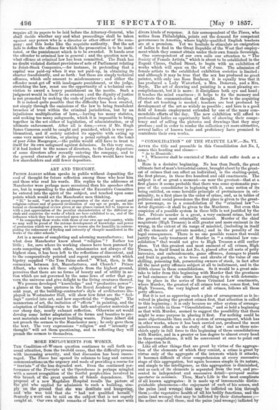ART AND THOUGHT.
PanecE ALBERT seldom speaks in public without depositing the seed of thought for future reflection among those who hear him and those who read his words. His replies to the addresses at Manchester were perhaps more occasional than his speeches often are, but in responding to the address of the Executive Committee he entered into the spirit of the subject, and touched upon some points which would set the Manchester men thinking.
"If," he said, "art is the purest expression of the state of mental and religious culture and, of general civilization of any age or people, an historical or chronological review given at one glance cannot fail to impress us with a just appreciation of the peculiar characteristics of the different periods and countries the works of which are here exhibited to us, and of the influence which they have exercised upon each other.
"In comparing these works with those of our own age and country, while we may well be proud of the intense development of knowledge and power of production which we possess, we have reason also for humility in contemplating the refinement of feeling and intensity of thought manifested in the works of the older schools."
Art is a means of completing and adorning manufactures ; but what does Manchester know about " religion " ? Rather too little ; for, save where its working classes have been pursued by seats competing with each other, missionaries not always of the highest class, it has been left to the reflections of discontent, and to the comparatively pointed and cogent arguments with which bigotry supplied "the Tom Paine school." What, then, is the connexion between Art, Manufactures, and Church? Prince Albert, who views all these subjects from the highest ground, perceives that there are no forms of beauty and of utility in action which are not governed by the same laws of order that govern the universe and give delight to the living creatures thereof. We possess developed " knowledge " and "productive power" : a glance at the tame pictures in the Royal Academy of the present year, at the building-contractor's style of architecture displayed in Westminster Hall, will show how faint are the "feelings" carried into art, and how superficial the "thought." The mannerism of art, the imitation of "effects" in painting, and the adaptation of building-rules to the lath-and-plaster materials of our cheap day, nearly exhaust reflection. Otherwise art would develop some better adaptation of its forms and beauties to present materials and to present building wants. Prince Albert did not preach the sermon to the Manchester men ; he only gave them the text. The very expressions " religion " and "intensity of thought" will set them questioning, and in reflecting they will preach the sermon to themselves.


























 Previous page
Previous page